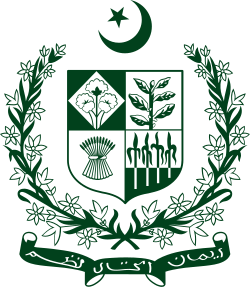| National Security Advisor | |
|---|---|
 | |
 | |
| Abbreviation | NSA |
| Reports to | Prime Minister of Pakistan |
| Seat | Prime Minister's Secretariat National Security Division |
| Appointer | Prime Minister of Pakistan |
| Formation | 1969 [1] |
| First holder | Ghulam Omar [1] |
| Website | nsd |
The National Security Advisor (NSA) is the senior official on the National Security Council of Pakistan, and the chief adviser to the Prime Minister of Pakistan on national security and international affairs. [1] Lt Gen Asim Malik is the current NSA, appointed by Prime Minister Shehbaz Sharif on 30 April 2025. [2]
Contents
The National Security Adviser participates in National Security Council to brief the participants on issues involving the national security of the country and regularly advise the Prime Minister on all matters relating to internal and external threats to the country, and oversees strategic issues. [3] In addition, the adviser frequently accompanies the Prime Minister on foreign trips. [3]
The National Security Adviser is supported by the National Security Division (NSD) at the Prime Minister's Secretariat in Islamabad that produces research and briefings for the National Security Adviser to review and present, either to the National Security Council or directly to the Prime Minister. [4] The post was created in 1969 by then-President Yahya Khan with Major-General Ghulam Omar being the first adviser. [1]
